How to write great customer reviews and why you need them
Reviews are crucial for informed consumer decisions and improving products/services across various industries, including healthcare, retail, and the tech industry in particular, where user feedback fuels constant innovation.
Good review examples often include pros and cons lists, detailed explanations, and relevant images or videos, verified identities, proper grammar, and respect for the reviewed business.
A well-structured review includes the business name, concise pros and cons, a detailed personal account with contextual information, and a neutral conclusion on the outcome.
Templates can help structure reviews, but personal experiences should always be the focus.
Reviews can be posted on various platforms, including Google reviews, social media platforms, YouTube, and dedicated review sites.
SE Ranking’s Local Marketing Tool helps businesses track, manage, and analyze customer reviews across multiple business locations.
SE Ranking values customer feedback, using reviews to enhance the product, clarify features, and guide development. This approach fosters customer loyalty and continuous improvement.
Businesses can encourage reviews by directly asking clients, targeting satisfied customers, personalizing review requests, explaining the importance of reviews, simplifying the process, and offering incentives.
What’s the first thing you do when you find something online and struggle with the purchase decision? That’s right, you do a little digging and read online reviews.
Sure, you can go to the website of the manufacturer to get more info. But it is thanks to people who take the time to sit down and write a review or record one on video that we are able to learn about a product’s nuances that the manufacturer conveniently does not tell us about. As a result, we are able to make informed, rational decisions.
Truth be told, everyone who writes online reviews as a force of habit is really helping improve consumer culture. Besides letting brands know that something’s off about their offering, reviews also warn customers of possible hidden pitfalls and help them find exactly what they’re looking for in the vast sea of competing options.
So, let’s embark on a journey to figure out how to write a great review, what to mention in it and what best-practice examples to aim for.
Download our free ebook to discover how AIOs evolved and sign up to SE Ranking’s news and SEO tips digests!
Click the link we sent you in the email to confirm your email
Why people write reviews and why they matter
In a nutshell, people usually leave reviews when they’ve had either a negative experience or a good experience. These strong reactions, whether good or bad, are what typically motivate customers to share their thoughts.
Other common motivations may include:
- Expressing disappointment if the experience of using the product/service was negative;
- Praising the company if the experience was positive and therefore help its development;
- Expressing feelings and draw inspiration from the review process;
- Getting recognition and gratitude for knowledge/experience/taste;
- Getting the feeling of community and being able to share personal experiences with others.
Interestingly, this coincides with the reasons why people read reviews. Consumers understand that reviews are written with honesty and passion, and turn to them as a credible source of information.
In fact, a recent study by ratings and review platform Bazaarvoice, surveying over 30,000 global shoppers, found that 88% of shoppers use reviews to learn about and assess products before making a purchase.
This creates a cycle where reviewers help future consumers make informed decisions, and those consumers in turn become the next generation of reviewers. It’s a community that sustains itself by sharing experiences and insights.
What makes a great review
Now, if you’re thinking that there is a one-size-fits-all review structure, you’re in for a disappointment. Everything really depends on the niche, the goal of the review, the author’s writing style and a number of other factors.
However, we can highlight key features that will help your reviews become useful to others, and will help you not waste your time in vain.
Give your personal opinion
Keep in mind that your reviews should only be about your own experiences—no one really wants to hear how many people face the same issue or if your friend ran into difficulties. So, be honest in what you say and only write reviews if you personally bought or used the reviewed product or service.
As a rule of thumb, aim to address specific situations. Perhaps you ordered a meal at a restaurant and had to wait for it too long for no apparent reason. Or maybe you managed to get a discount at a hotel because you struck the right chord with the receptionist. Whatever you do, don’t be afraid to leave constructive feedback in your reviews because, at the end of the day, your readers will benefit from them.

Provide details and images
Avoid being general in your wording and try to include as many details as possible. Depending on where you post your reviews, you will have different guidelines and requirements. For example, Google offers clear guidelines on the type of content that can be published in its reviews, and so does Amazon regarding its customer reviews.
Add photos and videos to your reviews when appropriate. Nowadays, everyone’s got a mobile device of some sort that can be used as a camera. Visual aid helps everyone who reads your reviews get a clearer picture of the issue you are addressing. And if you have an image or a video in your review, a lot more people are likely to take notice of it.
Focus on specific details in the review that are relevant only to the matter at hand. Ideally, you want readers to understand your situation as if they are in your shoes. Your reviews should include details like how often you visit the business or order the product/service, how long you usually have to wait to be served, and don’t forget to mention not only the quality of the product, but also of the service. For example, if you had to wait for a while before being served at a restaurant, the review readers will want to know the time of day when everything happened, if the restaurant was overcrowded, if the staff ignored you or was rude, and so on.
Another piece of advice is avoid getting personal and writing staff names in your reviews. Sure, it is tempting to praise a particular waiter at a restaurant or criticize a hostel administrator by telling others that they are no good. But if you do this and the waiter or hostel administrator gets fired or promoted as a result, your review will no longer be relevant.
For this reason, it’s best to omit all names and concentrate on the overall experience you got when using the reviewed product or service. Some review platforms won’t even allow you to include names in them and will replace them when moderating reviews.
Here are examples of two house cleaning reviews where one includes the names of the cleaning team and the other one doesn’t:
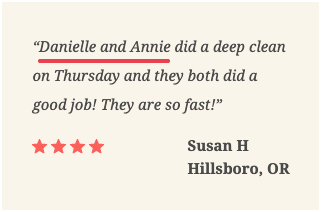

As you can see, the latter review doesn’t distract you from the main point by focusing only on the specifics of the provided service. But after reading the former review, we may get the feeling that we want Danielle and Annie to do cleaning for us and no one else.
Include personal information
Verify your identity, if possible. Although this method may not be completely suitable for every situation, it does instill confidence in the fact that your comment will stand out and that no one will doubt its authenticity.
Use your real name and contact information to build up your review’s credibility. That way, if your review’s readers have any follow-up or counter questions, they can reach out to you for help. Moreover, if one of the goals of your review is to get a response from an organization or a staff member, then you simply must provide your contact details along with the review.
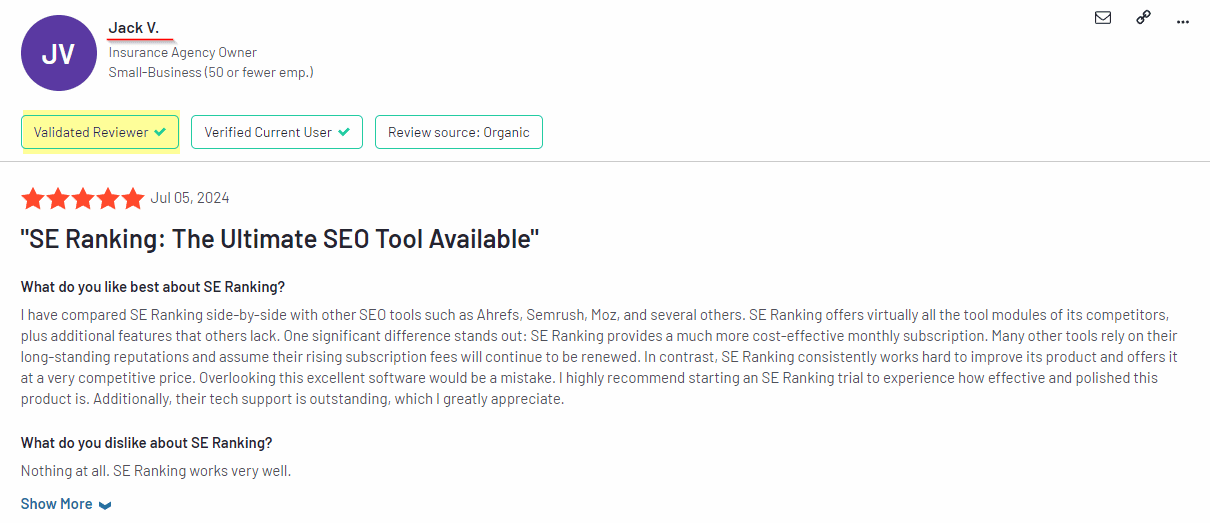
Again, we want to emphasize that this tip is not relevant for all situations because sometimes you need to maintain your anonymity to avoid getting punished, for example, by your employer or to remain anonymous to your neighbors or acquaintances if you are reviewing something in a small local community.
Add a list of pros and cons
Don’t forget that every story has two sides to it like a coin. But, unfortunately, positive reviews almost never get any answers or replies, plus the readers themselves may be skeptical about such reviews.
In turn, negative reviews get far more scrutiny. Indeed, bad reviews can be rather helpful if you manage to point out exactly why your story turned out the way it did and if you do your best to put yourself into the other party’s shoes.
Of course, sometimes there is no excuse for poor or substandard service, but if you try to show a little empathy and understanding, your review will have a better chance of being perceived as credible—even if the reader ultimately chooses not to do business with the reviewed business.
The proper and reasonable thing to do in your reviews is indicate both the advantages and disadvantages of the reviewed product/service. If you need time to sort out your thoughts and look at the situation from every possible perspective, make sure to do so. Don’t write in a fit of anger after you’ve reached your boiling point as this will lower your chances of being helpful.

Know your grammar and show respect
Since your reviews will be read by others, make sure they are easy to read. Don’t capitalize the entire text, use complete sentences, refrain from using exclamation marks and, most importantly, insults and profanities.
So, check your grammar and spelling before posting your reviews. Even if you are posting your reviews anonymously, write as if each review is addressed to you. Think about the emotional response it will evoke. Does it contain information that you find useful? Everything should be written within reason and logic, and be consistent even if you had terrible service at a store or if a product manufacturer refused to replace faulty goods.
Summing it up, a great review should:
- Be useful to others
- Contain essential information
- Reveal your story’s pros and cons
- Observe grammar rules, and
- Not offend others

The anatomy of a good review
Of course, it all depends on your goal, but if the perfect review could be put together piece by piece, it’d look something like this:
Name of service provider/restaurant/store
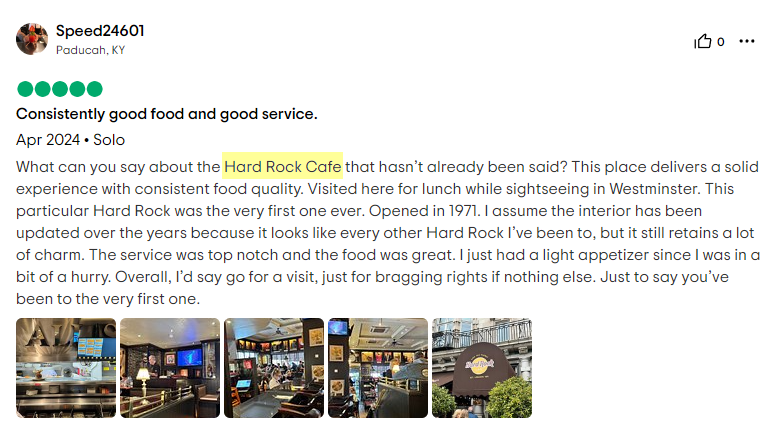
Pros and cons
Be simple, on point and concise. Use two to three words to highlight the most important parts of your experience.

Your story in detail
Include information such as time, date, location, and so on, as well as the story itself, presented on your behalf. Additionally, try to put yourself in the shoes of the reviewed business and share your thoughts on why everything turned out the way it did.
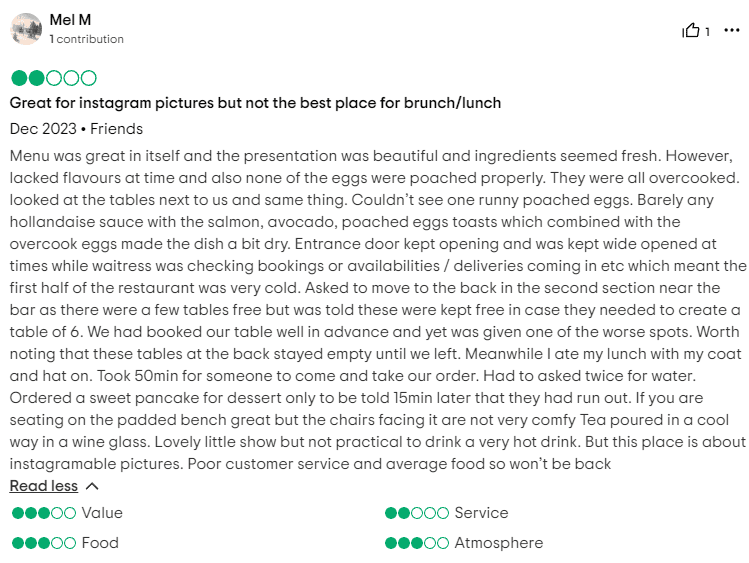
Summary comments
Comment on the outcome of the situation in a neutral tone and say how it was (or wasn’t) resolved.
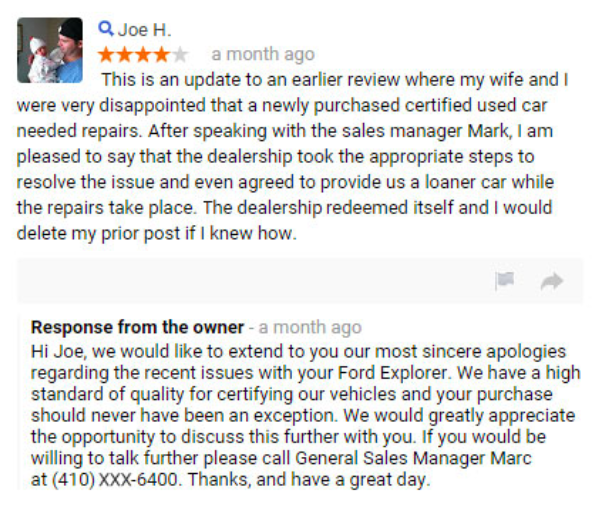
You can post your reviews on the business pages of restaurants on social media, on special review portals and even on the websites of the companies themselves. From there on, it all really depends on what you want to achieve with your review and the feature capabilities of the sites you are writing your reviews on.
Where reviews can be posted
The main driving forces in the world of reviews are your usual suspects: social media networks like Facebook, review platforms like Trustpilot, Yelp and G2, Google, and YouTube.
Social media
Find the Facebook page of the company you want to review and go to the Reviews tab.
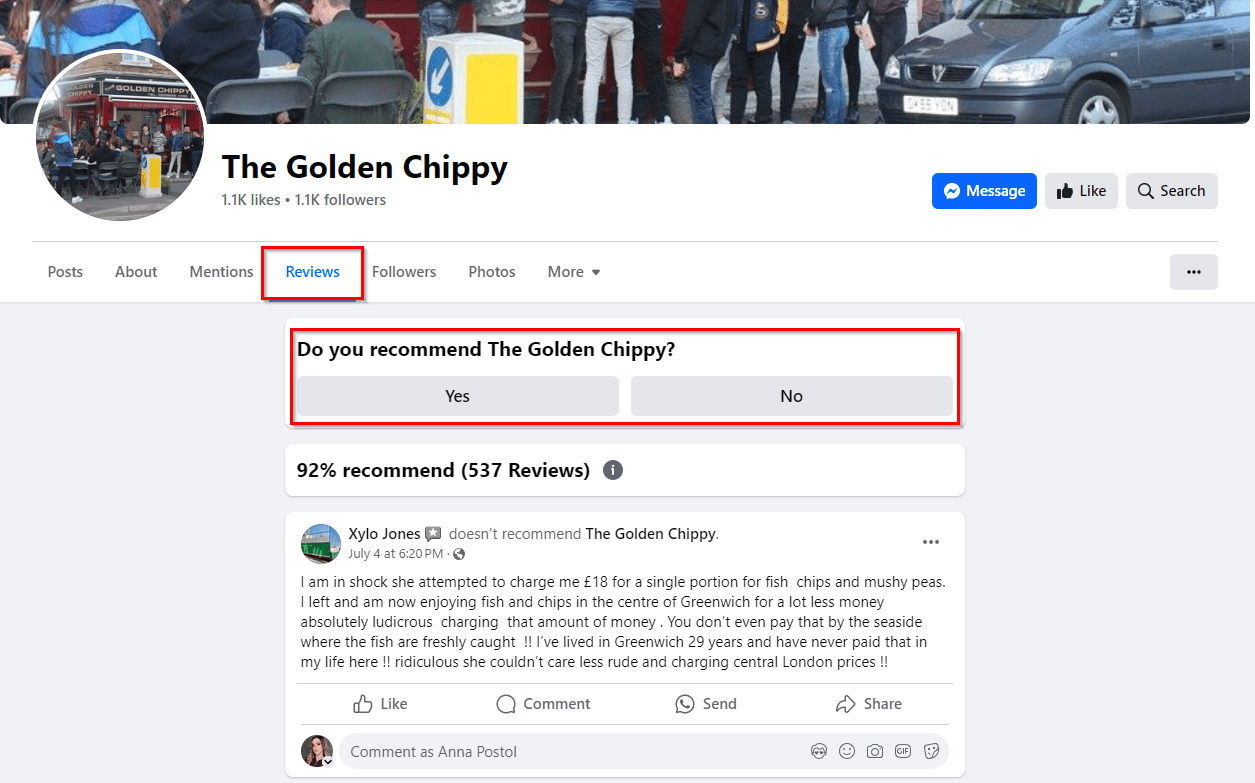
Click Yes to start creating your review, and pay attention that you need to write at least 25 characters in order to publish the review. On top of that, Facebook also offers a lot of quick response templates you can checkmark to make it easier for people to quickly understand the gist of your review.
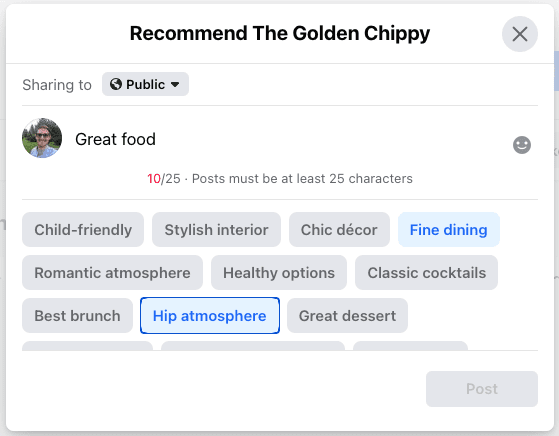
Unlike Instagram or X (ex-Twitter), LinkedIn also has a dedicated feature for customers to write reviews. On Instagram and Twitter, you can still get your message across by tagging the page of a business in your posts.
Review platforms
If the company you want to review has registered an account on a review site, you can add your feedback on its products/services right on their page.
Typically, you need to sign up on a review platform and fill out the offered feedback form to leave a review. Most review sites allow you to build up your reputation as an expert reviewer by leaving more and more reviews.
Here are some of the most popular review platforms you can work with:
- Amazon
- Yelp
- TripAdvisor
- G2
- Trustpilot
- Bazaarvoice
- Yotpo
- Reviews.io
- Shopper Approved
- Feefo
- Birdeye
- Podium
- PowerReviews
Other review platforms
Besides using social media and review platforms to publish your reviews, there are several other places you can do this. For example:
- Google Business Profile
- Google Maps
- Videos and comments on YouTube and other video hosting platforms like Wistia, Vidyard and Vimeo
- Blog comments and dedicated website pages of businesses
- Niche and local forums
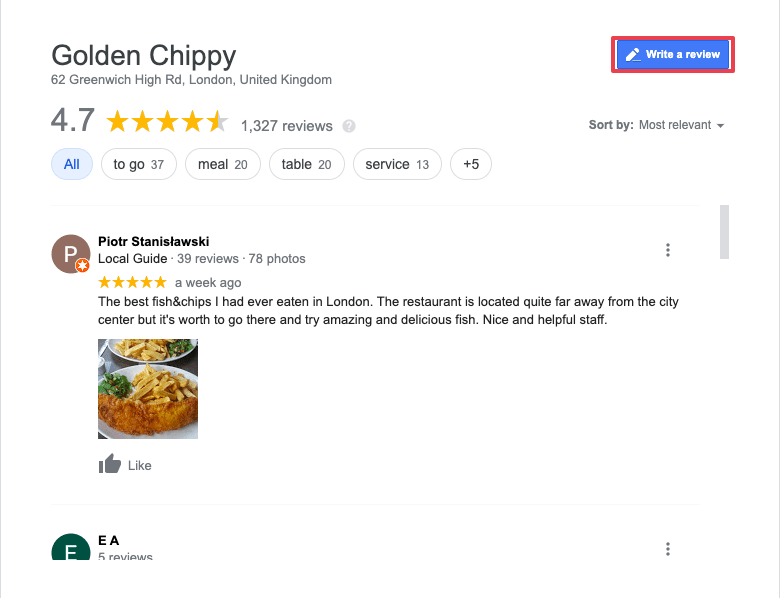
Managing reviews with our Local Marketing Tool
Since managing your online reputation is crucial for your local marketing success, the SE Ranking team has developed its very own Local Marketing Tool.
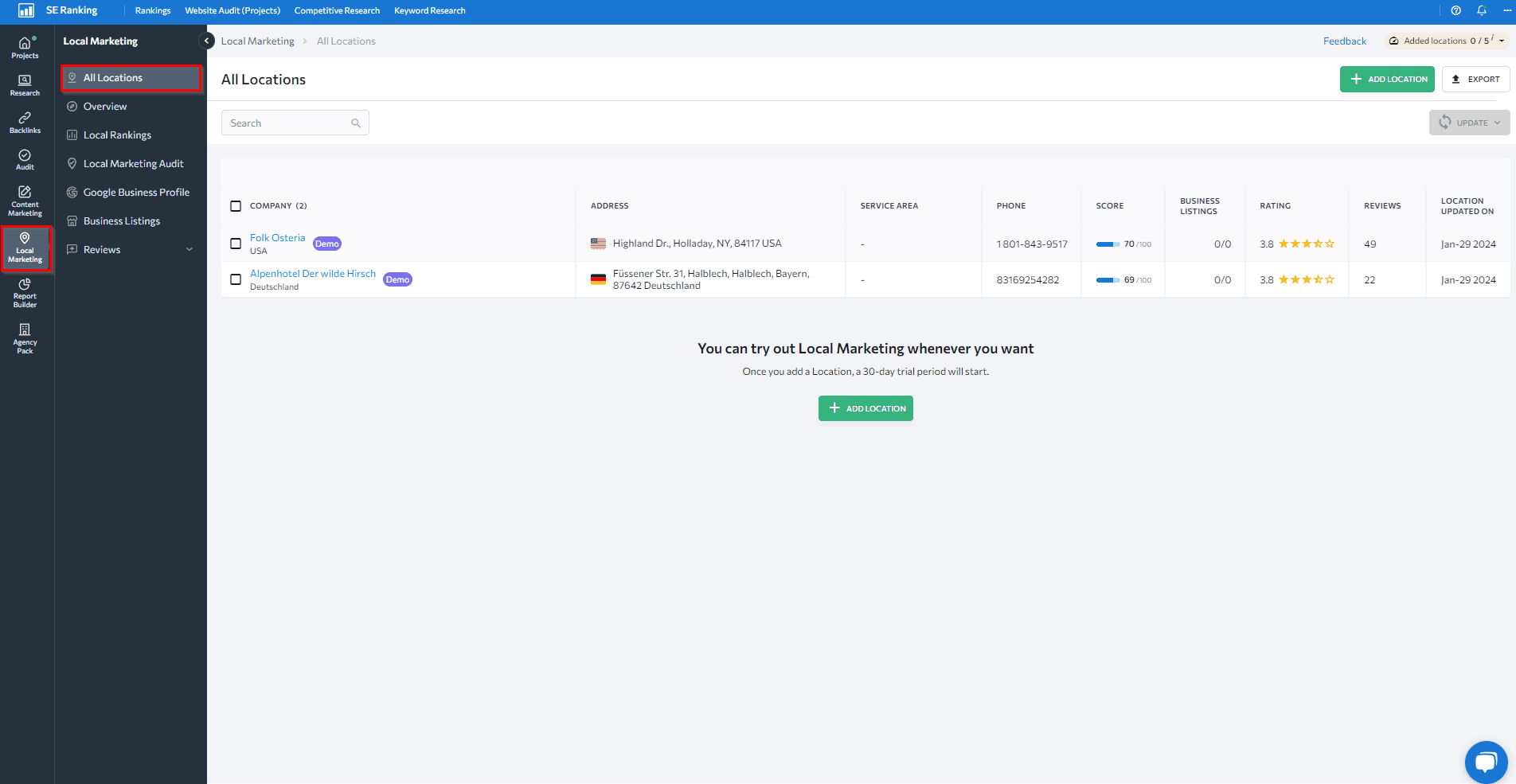
This tool can help you by keeping track of your Google Maps rankings across multiple business locations. It can also point out different ways to improve your Google Business Profile and monitor NAP data consistency across relevant business listings. Additionally, you can use it to keep your finger on, analyze, and respond to reviews from various sources, namely Google, Facebook, Yelp, Foursquare, and Tripadvisor.
You can conveniently access all your reviews in a single location, evaluate how they impact your overall rating, and get insights through a semantic analysis of customer feedback.
When it comes to managing customer reviews, SE Ranking’s Local Marketing Tool can help in the following ways:
- Easily reply to Google and Facebook reviews directly from the platform, change their status, or assign them to a responsible manager.
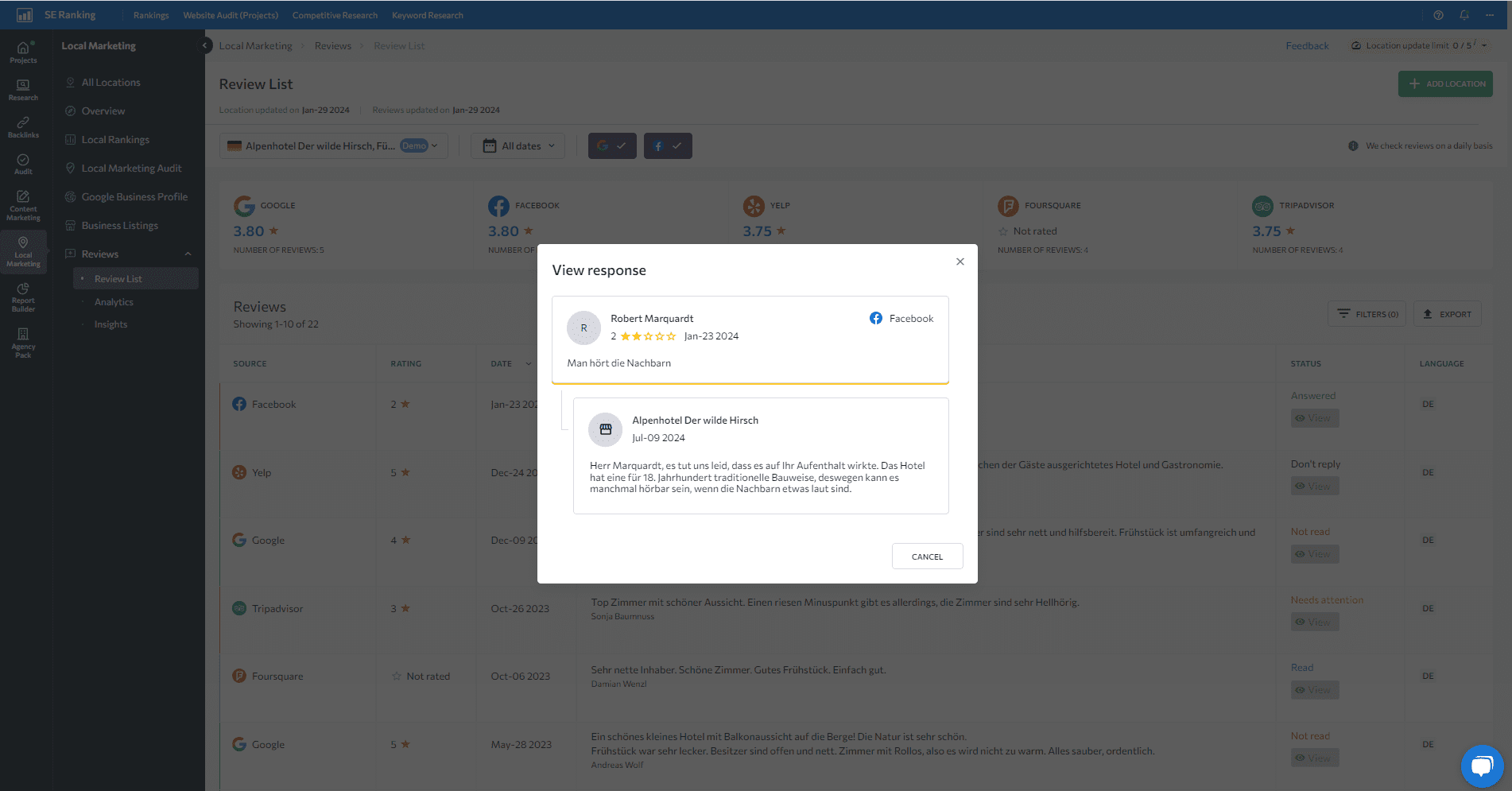
- Track review dynamics over time and see how they are distributed by rating and source.
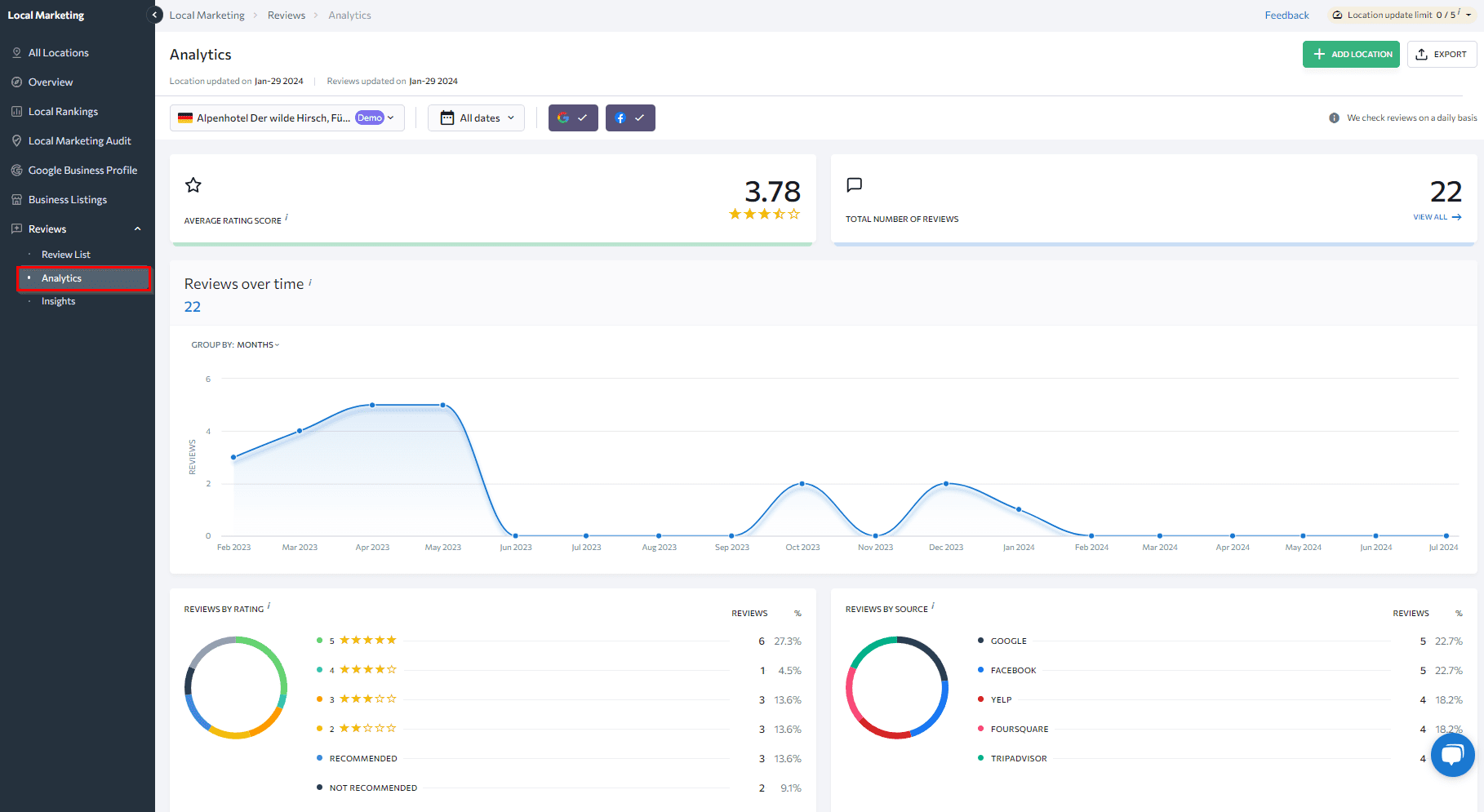
- Discover any keywords and phrases that customers are using to describe your business, products, or services.
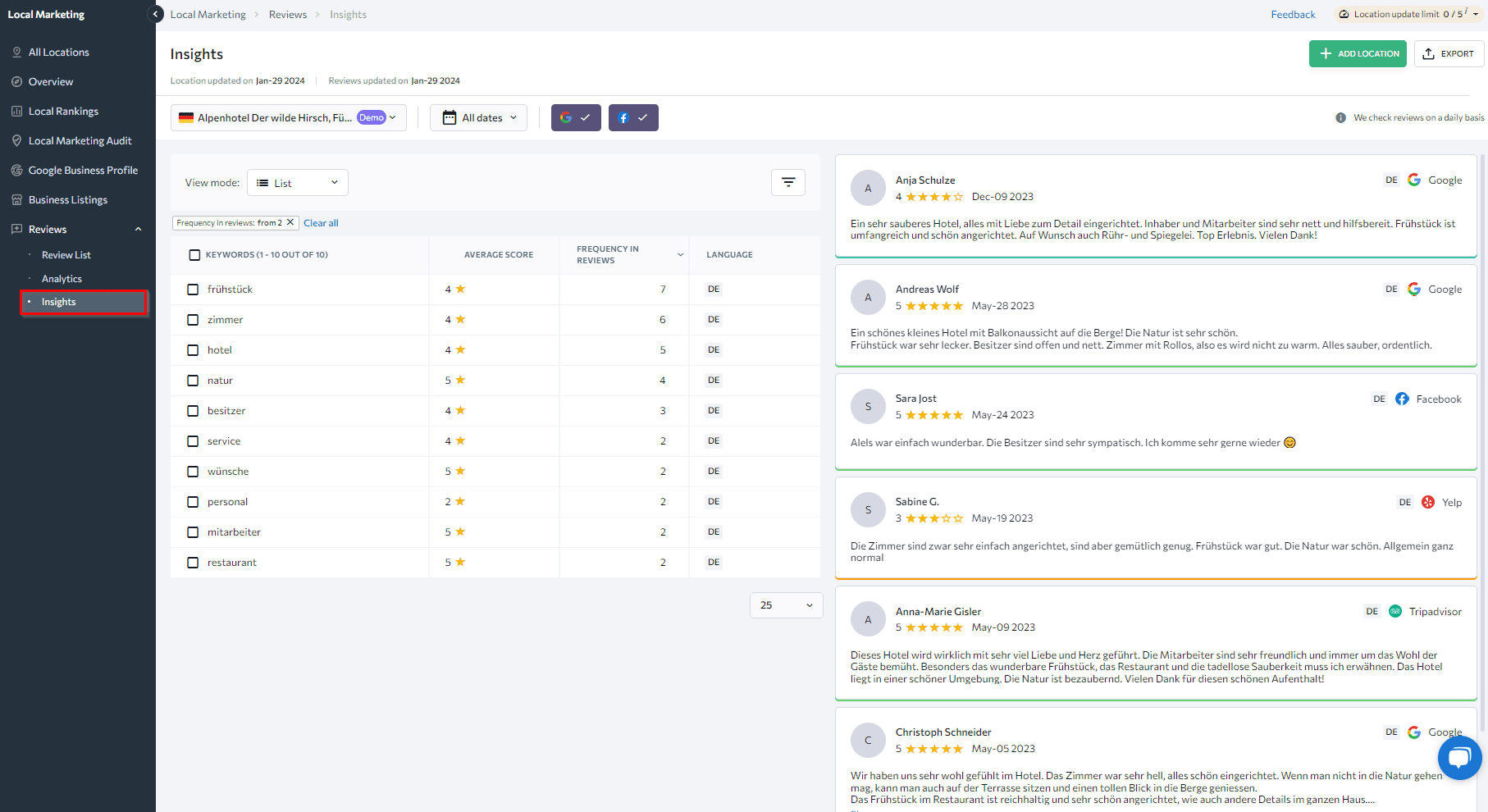
- Identify your business’s strengths and weaknesses from the customer’s perspective and improve customer satisfaction.
SE Ranking’s Local Marketing Tool is a powerful solution for managing your online reputation and boosting your local search visibility. Try it for free today and see how it can help you grow your business!
How we handle reviews at SE Ranking
As you may have already guessed, the main purpose of a good review is to benefit readers and to bring them value. On top of that, it can also encourage the reviewed business to make positive changes.
In this regard, we at SE Ranking are lucky to have amazing customers who are kind enough to regularly provide feedback on our tools, be it via our blog or social media comments, support tickets and chats, or third-party platforms like Trustpilot, G2, and the like.
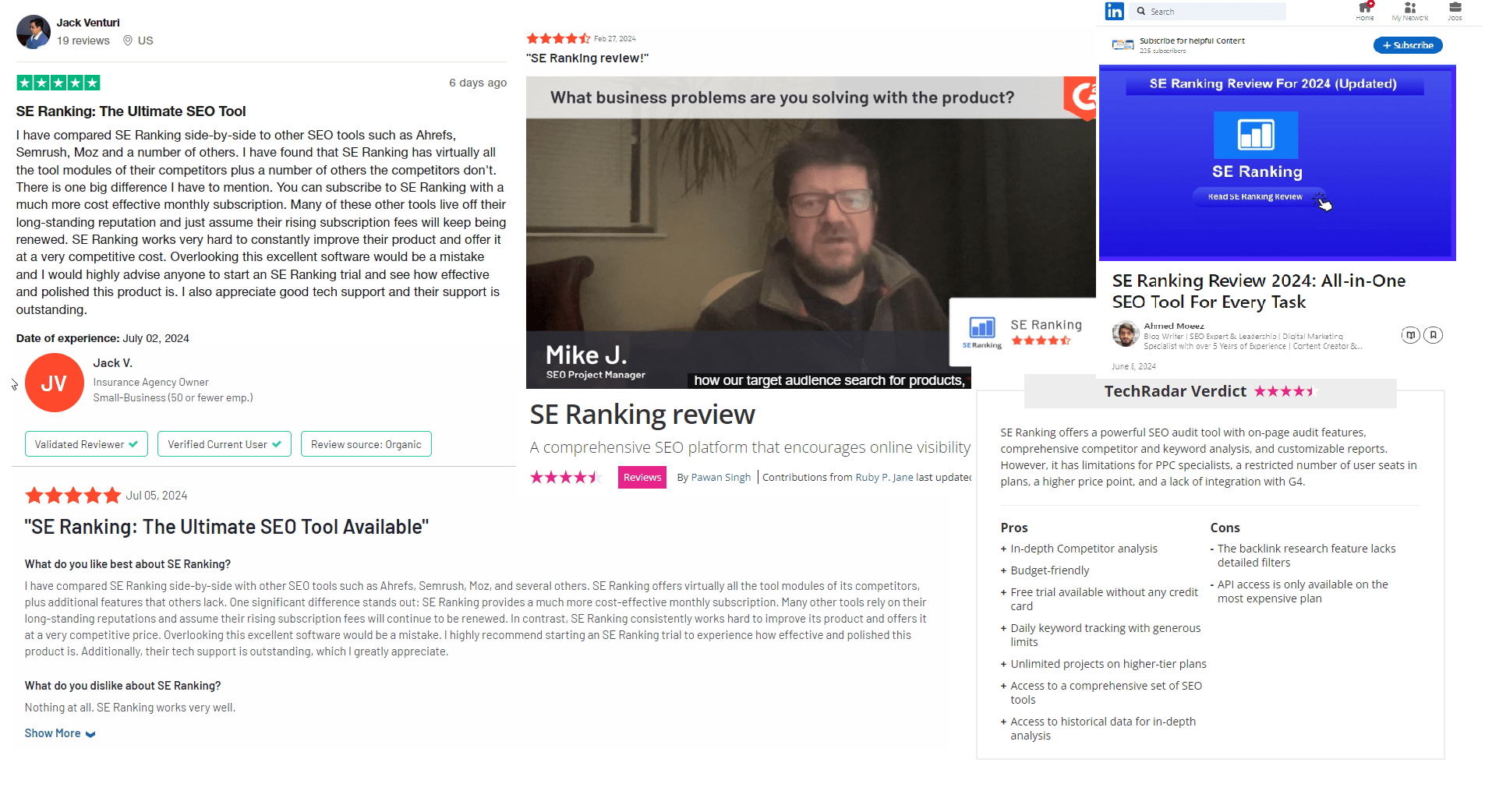
How we and our customers benefit from reviews
1. We get feedback from our customers and are able to react quickly.
For example, we’ve had customers who didn’t know they could track their keyword rankings not only in organic, but in paid search as well. One of such customers decided to write a review saying that everything is great on our platform, but they wouldn’t recommend it because it doesn’t have any keyword rank tracking capabilities. So, we reached out to this customer and pointed out to them that we do have the rank tracking feature and showed them how it works. As a result, we got a satisfied and loyal SE Ranking Ambassador.
If you have an SE Ranking subscription, but don’t yet use our signature SEO keyword ranking checker, make sure to check it out.
2. We monitor user reviews for improvement and development ideas.
Every year, we ask our customers to make a wish telling us how we can make our platform better. We then process them and add them to our roadmap for the year. And we make sure to do it publicly online. Some customers, for example, ask us for an enhanced Report Builder to create more professional client presentations, others need additional functions in the SMM module to produce high-quality SMM campaigns for their clients. Whatever their wish may be, we collect all of them and gradually roll them out with every new platform update. Ultimately, everyone who makes a wish becomes an ideological “developer” of our tools and gets the opportunity to experience the improved service firsthand.
3. We show our customers we care.
We respond to their feedback, improve the user experience, and, in turn, they continue doing business with us from year to year. Earning this kind of loyalty is vitally important to any business and is extremely valued at SE Ranking.
By the way, if you too want to participate in the development of SE Ranking tools, we encourage you to help us become better by sharing your experience.
Let us know what you think of our SEO platform by reviewing us on Trustpilot. What do you like about SE Ranking? What could be improved? Is there a tool or feature you specifically need? We’d love to hear your thoughts, so share away.
BONUS: How to encourage people to leave reviews
The biggest question is how do you get customers to write awesome reviews online for your business. Here are proven tips recommended by experts:
- Directly ask your customers for reviews (ideally, automate the process)
- Target satisfied customers
- Make the review request personal
- Say why reviews are important for your business
- Make it easy for people to write reviews (create a step-by-step how-to video)
- Offer an incentive like a voucher card or throw in a gift with the product
- Follow up on your requests
However, one of the most important factors in boosting the number of reviews you get is providing an exceptional product or service. If you think about it, if your offer is terrible, you probably won’t even need to ask for reviews.
If you are just reading our blog and are not yet familiar with the platform, you can test it out for 2 weeks absolutely free. If you run into any difficulties and need help figuring things out, our support team is always eager to help.
What is your experience with writing or working with customer reviews? We’d love to hear all about it, so spill the beans in the comments section below!
Final remarks
Reviews are no longer just a nice-to-have – they’re essential part of the customer experience. They provide prospective customers with real-world insights, helping them make informed decisions when they shop. For businesses, these customer review examples are sources of feedback that drive improvement and innovation.
Writing a helpful review is all about honesty, giving details, and being fair. Whether you’re leaving a glowing five-star review or offering constructive criticism, your input matters. Businesses can learn a lot from both positive review examples and negative feedback, using them to refine their products and services.
For companies, responding to reviews is just as important as receiving them. Positive review response examples show how businesses value their customers’ input. Many companies even use positive review response templates to ensure they address feedback consistently and professionally.
In the end, reviews create a more transparent and customer-centric marketplace. They give сustomers a voice and businesses a chance to improve. So next time you have a great experience, don’t hesitate to leave a compliment. And if you’re a business owner, embrace reviews as a powerful tool for growth. After all, in this interconnected world, we’re all working together to create better products, services, and customer experiences.
FAQs
1. What should I write in a helpful review?
To write a good review, it’s important to be specific, honest, and balanced. Include what you liked and any issues you faced. Provide relevant details about your experience, as your insights can be valuable to both businesses and potential customers.
2. Why do we need good customer reviews?
Good customer reviews are important because they build trust and influence decision-making. They offer valuable insights into products and services, reduce uncertainties, and contribute to improved SEO rankings, which results in increased visibility and greater customer acquisition.
3. Why are customer reviews important?
Customer reviews provide businesses with direct feedback about their products or services. They help businesses identify their strengths and weaknesses. Moreover, positive reviews can enhance a business’s reputation, improve SEO, and attract new customers.
4. How can businesses encourage customers to leave reviews?
Businesses can encourage customers to leave reviews by directly requesting them, targeting satisfied customers, and simplifying the review process. Incentives like vouchers and gifts can also work, but the most critical factor is providing an outstanding product or service.
5. How should businesses respond to negative reviews?
When addressing negative reviews, businesses should respond in a professional and empathetic manner. Acknowledge the customer’s experience, apologize if necessary, and propose a solution. This shows potential customers that the business values feedback and is committed to resolving issues.
6. Can businesses improve their products or services based on customer reviews?
Absolutely. Customer reviews often highlight areas where the product or service can be improved. By actively listening to their customers, businesses can make changes that enhance the user experience and better meet customer needs.
7. Are there specific platforms that businesses should prioritize for customer reviews?
The choice of platform depends on the nature of the business, but some popular platforms include Google, Yelp, and Trustpilot. Businesses should prioritize the platforms that their target audience uses most.
8. How can businesses handle fake or misleading reviews?
Businesses should monitor their reviews regularly and report any fake or misleading reviews to the platform where they are posted. This ensures the integrity of the review process and helps ensure that potential customers can access accurate and honest feedback.
9. Should businesses incentivize customers to leave reviews?
Offering incentives can be a good strategy to encourage reviews, but businesses must be careful. Incentives should only be given in exchange for positive reviews. Customers should feel empowered to express their honest opinions.
10. How can reviews impact SEO?
While reviews do not significantly impact SEO, they strongly contribute to local SEO. Reviews can enhance a business’s local search ranking, especially when they include keywords associated with the brand.
